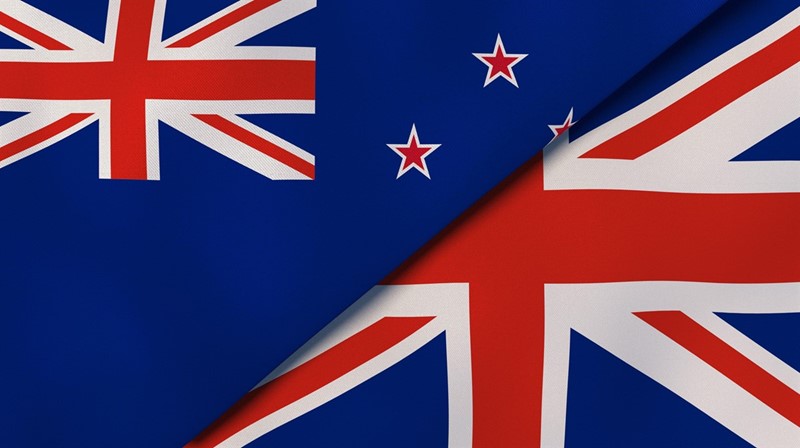UK and New Zealand governments have agreed to eliminate tariffs on all goods as part of a new trade deal. A tariff is a type of tax on imported goods that can either be a percentage or it can be based on a formula.
For UK exports going to New Zealand this will happen immediately as soon as the agreement comes into force.
For imports from New Zealand into the UK, most will be eliminated immediately, but some will be phased out over a period of years.
What about the sensitive sectors?
Four sectors (red meat, dairy, cereals and horticulture) have been classified as sensitive, which means tariffs are reduced over time rather than immediately. They represent areas where New Zealand is particularly competitive compared to the UK, with the potential to increase its share in the UK domestic market.
New Zealand may be relatively small with less than five million people, but it punches well above its size on the international market and most of its farmers produce for export. For example, over 90% of the beef and 95% of the milk they produce is sent to over 130 countries. Their dairy products include powders, butter and cheese.
Safeguards
If it can be demonstrated that there is harm or threat of harm (for example sustained reduction in price) to domestic industry, bilateral safeguards can be applied to all goods.
These safeguards, which in practise look like the re-introduction of tariffs, can be used to protect ourselves against a flood of imports in the future.
It is disappointing that the government has agreed a time limit on the use of safeguards for agricultural products.
This means that no safeguards will be available for any products after five years once their corresponding tariff is fully liberalised even if imports reach damaging levels.
Lower cost of production in New Zealand
The cost of producing in New Zealand is much lower than in the UK. For example, the cost of producing lamb in New Zealand is 63% lower and milk 25% lower than in the UK. This is because New Zealand farmers face different regulatory and climatic conditions that allows them to reduce their fixed costs. A good example of this is that animals don’t need to be housed for as long which reduces the need for buildings. With less people there is also less competition for land and farms tend to be much larger.
Access to seasonal labour and pesticides
Farmers in New Zealand also have access to reliable sources of seasonal labour and access to more pesticides that help combat weeds, pests and diseases.
This is in stark contrast to the UK, where growers are struggling to access the labour they need and are losing access to many pesticides.
Deals like this could set a precedent for future trade with areas such as Canada, USA and South America. Fully liberalising the UK’s sensitive agricultural sectors, even with 'phase out' periods for tariffs, undermines the investments that UK farmers have been making, both on farm but also in increasing their market share at home and abroad. At a time when domestic support for agriculture is also being completely overhauled, it adds to the uncertainty and ultimately creates unfair conditions for our farmers to compete on.
Does New Zealand want increased access to our market?
In short, yes.
To explain, here are the forces at work.
New Zealand is well placed to take advantage of markets like China, Japan, the US and others.
As a result, the volume of product coming from Oceania into Western Europe has decreased. This is why Australia and New Zealand say they have no intention of flooding our market with cheap imports – as they are instead focused on other, sometimes more lucrative, markets closer to home.
However, New Zealand is also very reliant on China and currently exports a large proportion of its production there.
New Zealand want alternatives to Chinese market
The Chinese market can be fickle and is often driven by politics rather than the fundamentals of supply and demand. As a result, New Zealand is keen to ensure they have alternative markets which they could redirect product into if something went wrong elsewhere. This is why they are so eager to secure unrestricted access into the UK.
When is the agreement going to be implemented?
After the deal was signed in February 2022, the agreement entered force on 31 May 2023 following an implementation process in UK parliament.
What does this all mean?
By agreeing trade deals like this with New Zealand and Australia, British farmers are being asked to go toe-to-toe with some of the most competitive and export orientated producers in the world. We can try to compete, but the playing field is not level.
Lower cost of farming in New Zealand
The lower cost of farming in New Zealand, in part due to their natural advantages but also cheaper inputs, coupled with their comprehensive government backed export strategy means it will be an uphill struggle.
We are ready to work with government
We stand ready to work with government to make the gains necessary to operate in this new trading environment. The NFU has already started the conversation on many of these issues. For example, our dairy export strategy sets out what we think needs to be done to grow sales and increase the value of British dairy around the world. But we need to see government come to the table.
If we don’t join up and reconcile domestic policy which sees new more onerous regulations being introduced with the approach to international trade where markets are being opened up, British farming and food production may pay the price.
